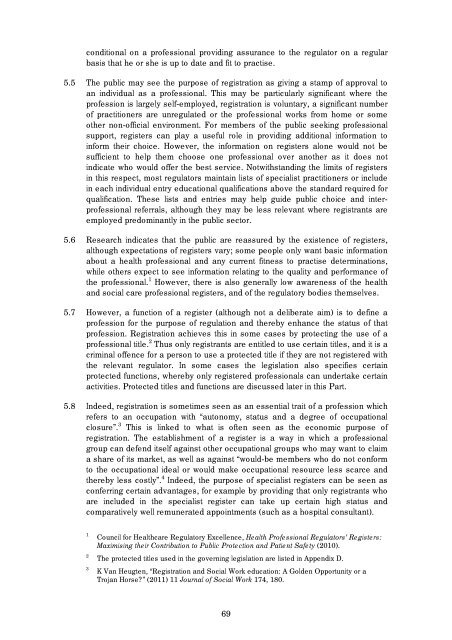Regulation of Health and Social Care Professionals Consultation
Regulation of Health and Social Care Professionals Consultation
Regulation of Health and Social Care Professionals Consultation
Create successful ePaper yourself
Turn your PDF publications into a flip-book with our unique Google optimized e-Paper software.
conditional on a pr<strong>of</strong>essional providing assurance to the regulator on a regular<br />
basis that he or she is up to date <strong>and</strong> fit to practise.<br />
5.5 The public may see the purpose <strong>of</strong> registration as giving a stamp <strong>of</strong> approval to<br />
an individual as a pr<strong>of</strong>essional. This may be particularly significant where the<br />
pr<strong>of</strong>ession is largely self-employed, registration is voluntary, a significant number<br />
<strong>of</strong> practitioners are unregulated or the pr<strong>of</strong>essional works from home or some<br />
other non-<strong>of</strong>ficial environment. For members <strong>of</strong> the public seeking pr<strong>of</strong>essional<br />
support, registers can play a useful role in providing additional information to<br />
inform their choice. However, the information on registers alone would not be<br />
sufficient to help them choose one pr<strong>of</strong>essional over another as it does not<br />
indicate who would <strong>of</strong>fer the best service. Notwithst<strong>and</strong>ing the limits <strong>of</strong> registers<br />
in this respect, most regulators maintain lists <strong>of</strong> specialist practitioners or include<br />
in each individual entry educational qualifications above the st<strong>and</strong>ard required for<br />
qualification. These lists <strong>and</strong> entries may help guide public choice <strong>and</strong> interpr<strong>of</strong>essional<br />
referrals, although they may be less relevant where registrants are<br />
employed predominantly in the public sector.<br />
5.6 Research indicates that the public are reassured by the existence <strong>of</strong> registers,<br />
although expectations <strong>of</strong> registers vary; some people only want basic information<br />
about a health pr<strong>of</strong>essional <strong>and</strong> any current fitness to practise determinations,<br />
while others expect to see information relating to the quality <strong>and</strong> performance <strong>of</strong><br />
the pr<strong>of</strong>essional. 1 However, there is also generally low awareness <strong>of</strong> the health<br />
<strong>and</strong> social care pr<strong>of</strong>essional registers, <strong>and</strong> <strong>of</strong> the regulatory bodies themselves.<br />
5.7 However, a function <strong>of</strong> a register (although not a deliberate aim) is to define a<br />
pr<strong>of</strong>ession for the purpose <strong>of</strong> regulation <strong>and</strong> thereby enhance the status <strong>of</strong> that<br />
pr<strong>of</strong>ession. Registration achieves this in some cases by protecting the use <strong>of</strong> a<br />
pr<strong>of</strong>essional title. 2 Thus only registrants are entitled to use certain titles, <strong>and</strong> it is a<br />
criminal <strong>of</strong>fence for a person to use a protected title if they are not registered with<br />
the relevant regulator. In some cases the legislation also specifies certain<br />
protected functions, whereby only registered pr<strong>of</strong>essionals can undertake certain<br />
activities. Protected titles <strong>and</strong> functions are discussed later in this Part.<br />
5.8 Indeed, registration is sometimes seen as an essential trait <strong>of</strong> a pr<strong>of</strong>ession which<br />
refers to an occupation with “autonomy, status <strong>and</strong> a degree <strong>of</strong> occupational<br />
closure”. 3 This is linked to what is <strong>of</strong>ten seen as the economic purpose <strong>of</strong><br />
registration. The establishment <strong>of</strong> a register is a way in which a pr<strong>of</strong>essional<br />
group can defend itself against other occupational groups who may want to claim<br />
a share <strong>of</strong> its market, as well as against “would-be members who do not conform<br />
to the occupational ideal or would make occupational resource less scarce <strong>and</strong><br />
thereby less costly”. 4 Indeed, the purpose <strong>of</strong> specialist registers can be seen as<br />
conferring certain advantages, for example by providing that only registrants who<br />
are included in the specialist register can take up certain high status <strong>and</strong><br />
comparatively well remunerated appointments (such as a hospital consultant).<br />
1 Council for <strong>Health</strong>care Regulatory Excellence, <strong>Health</strong> Pr<strong>of</strong>essional Regulators’ Registers:<br />
Maximising their Contribution to Public Protection <strong>and</strong> Patient Safety (2010).<br />
2 The protected titles used in the governing legislation are listed in Appendix D.<br />
3 K Van Heugten, “Registration <strong>and</strong> <strong>Social</strong> Work education: A Golden Opportunity or a<br />
Trojan Horse?” (2011) 11 Journal <strong>of</strong> <strong>Social</strong> Work 174, 180.<br />
69
















